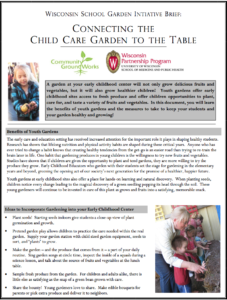 A garden at your early childhood center will not only grow delicious fruits and vegetables, but it will also grow healthier children! Youth gardens offer early childhood sites access to fresh produce and offer children opportunities to plant, care for, and taste a variety of fruits and vegetables. In this document, you will learn the benefits of youth gardens and the measures to take to keep your students and your garden healthy and growing! Download Brief »
A garden at your early childhood center will not only grow delicious fruits and vegetables, but it will also grow healthier children! Youth gardens offer early childhood sites access to fresh produce and offer children opportunities to plant, care for, and taste a variety of fruits and vegetables. In this document, you will learn the benefits of youth gardens and the measures to take to keep your students and your garden healthy and growing! Download Brief »
Telling Your Garden Story
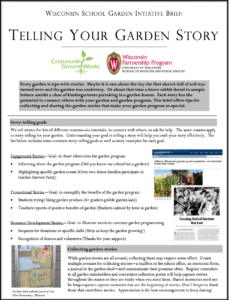 Every garden is ripe with stories. Maybe it is one about the day the first shovel-full of soil was turned over and the garden was underway. Or about that time a brave rabbit dared to sample lettuce amidst a class of kindergartners partaking in a garden lesson. Each story has the potential to connect others with your garden and garden program. This brief offers tips for collecting and sharing the garden stories that make your garden program so special. Download Brief »
Every garden is ripe with stories. Maybe it is one about the day the first shovel-full of soil was turned over and the garden was underway. Or about that time a brave rabbit dared to sample lettuce amidst a class of kindergartners partaking in a garden lesson. Each story has the potential to connect others with your garden and garden program. This brief offers tips for collecting and sharing the garden stories that make your garden program so special. Download Brief »
Water Conservation & Education in School Gardens
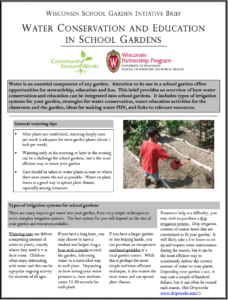 Water is an essential component of any garden. Attention to its use in a school garden offers opportunities for stewardship, education and fun. This brief provides an overview of how water conservation and education can be integrated into school gardens. It includes types of irrigation systems for your garden, strategies for water conservation, water education activities for the classroom and the garden, ideas for making water FUN, and links to relevant resources. Download Brief »
Water is an essential component of any garden. Attention to its use in a school garden offers opportunities for stewardship, education and fun. This brief provides an overview of how water conservation and education can be integrated into school gardens. It includes types of irrigation systems for your garden, strategies for water conservation, water education activities for the classroom and the garden, ideas for making water FUN, and links to relevant resources. Download Brief »
Outdoor Classrooms for Young Learners
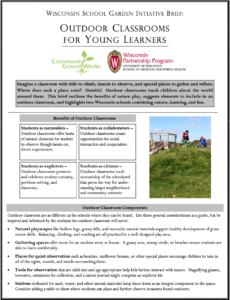 Imagine a classroom with hills to climb, insects to observe, and special places to gather and reflect. Where does such a place exist? Outside! Outdoor classrooms teach children about the world around them. This brief outlines the benefits of nature play, suggests elements to include in an outdoor classroom, and highlights two Wisconsin schools combining nature, learning, and fun. Download Brief »
Imagine a classroom with hills to climb, insects to observe, and special places to gather and reflect. Where does such a place exist? Outside! Outdoor classrooms teach children about the world around them. This brief outlines the benefits of nature play, suggests elements to include in an outdoor classroom, and highlights two Wisconsin schools combining nature, learning, and fun. Download Brief »
Multicultural Salad
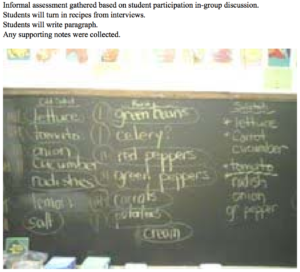 This is a nice garden lesson developed by Detroit fourth grade teacher Phyllis Mrozek that helps students connect science and culture via the school garden. View Resource »
This is a nice garden lesson developed by Detroit fourth grade teacher Phyllis Mrozek that helps students connect science and culture via the school garden. View Resource »
